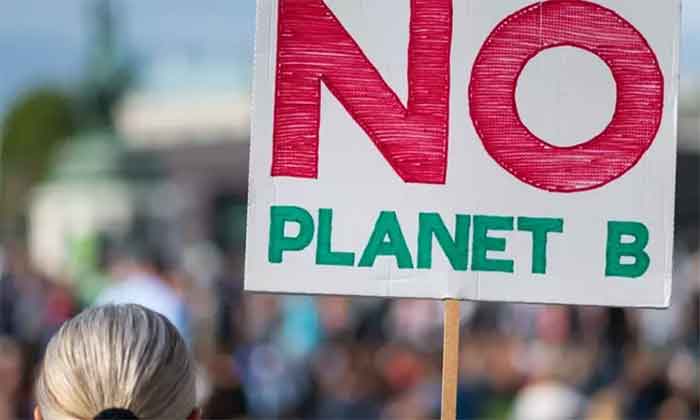
Series Note: We are in the middle of an unprecedented crisis as the Covid-19 pandemic, and the lockdowns implemented in response, continue to deliver a series of economic, social and psychological shocks to the world. In this time of chaos, some of the world’s most powerful interest groups have stepped forward claiming that this crisis presents an opportunity to ‘reset’ the world’s systems.
Leading the charge is Geneva-based World Economic Forum (WEF) with its ‘Great Reset’ initiative, an ambitious plan to shape the contours of the post-Covid world. This three-part series critically examines the origin, workings and implications of the Great Reset agenda, which its critics have denounced as the corporate capture of global governance and the global commons.
The third part explores the close alignment of the Indian establishment with the WEF agenda, and its role in shaping recent Indian policy including the new farm bills which are facing stiff resistance from farmers’ groups.
Read Part 1: When the ‘Fourth Industrial Revolution’ comes knocking
Read Part 2: The Great Reset: The Davos playbook for the post-Covid world
The Modi government and India’s business elite are keen to embrace global capital’s ambitious plans to shape the post-Covid world. However, the massive farmers’ protests have put a spoke in the project’s wheel.
The Geneva-based World Economic Forum (WEF) is well-known as the premier mouthpiece and ‘influencer’ for the interests of global capital today. Its ambitious ‘Great Reset’ initiative, a brainchild of its executive director Klaus Schwab, is an unprecedented effort to shape the post-Covid world, and holds profound implications for India and the world.
As one critic described it, the Great Reset is a “massively funded, desperately ambitious, internationally coordinated project led by some of the biggest multinational corporations and financial players on the planet and carried out by cooperating state bodies and NGOs.” It proposes a radical transformation, primarily of the global economy and its production and distribution systems, but going further, of every sector from health to education, agriculture to nature conservation, to pull in nearly every aspect of life on the planet.
The centrepiece of the plan is an attempt to manage and direct the ‘Fourth Industrial Revolution’ or Industry 4.0, the sweeping technological shift that’s being ushered by the convergence of emerging technologies such as Artificial Intelligence (AI), nanotech, biotech and robotics, a shift which the WEF has actively championed. (The first and second parts of this series covered the Fourth Industrial Revolution and the origins of the Great Reset respectively.).
On the surface, the Great Reset presents itself as a plan by the world’s ‘enlightened capitalists’ to reform an out-of-control capitalism that chases profits at the cost of people and the planet. In the process, it promises to solve the most pressing challenges faced by humanity, from inequality to discrimination, from climate change to social unrest.
It aims to bring about this transformation by, among other things, building a ‘stakeholder economy,’ greater ‘public-private partnerships,’ comprehensive and intensive use of ‘smart technologies’, a total revamping of the world’s governance systems and policy frameworks, and so on.
Crisis as opportunity
The critics aren’t buying any of it. Naomi Klein, author of The Shock Doctrine: The Rise of Disaster Capitalism, thinks of the Great Reset as “not a serious effort to actually solve the crises it describes,” but yet another attempt by the Davos class to pose as saviours of the world while advancing their interests. “All kinds of dangerous ideas are lurking under its wide brim, from a reckless push toward more automation in the midst of a joblessness crisis, to the steady move to normalize mass surveillance and biometric tracking tools,” she wrote recently.
Food sovereignty activist and author Vandana Shiva goes a step further, saying that it’s about the WEF’s corporate backers “controlling as many elements of planetary life as they possibly can. From the digital data humans produce to each morsel of food we eat. The Great Reset is about maintaining and empowering a corporate extraction machine and the private ownership of life.”
German investigative journalist Norbert Häring, who calls the WEF “the club of the world’s richest people and the largest nature-destroying corporations,” views the Great Reset as one of the biggest social engineering exercises of all time. “The feeling that something is going terribly wrong and that a reset is really necessary is very widespread in society. Thus, for those who benefit most from the current situation, there is an urgent need to control the discussion. And this is exactly what the Great Reset is for,” he says.
Moscow-based political analyst Andrew Korybko echoes this view, saying that the Great Reset “is not a “conspiracy theory,” but simply a strategy for capitalising on the prevailing chaotic conditions of the contemporary world to advance prior plans that might not have been popular under other conditions.”
The critics’ fears are justified, given what we know of the WEF’s track record, which, among other things, includes a systematic attempt to hijack the U.N. system on behalf of its billionaire backers. The Great Reset is their global playbook for the post-Covid world, which, in the guise of reforming capitalism, seeks a greater role for capitalism in the world. It is but yet another attempt – perhaps the most ambitious till date – at the corporate takeover of global governance, and what’s left of the global commons.
A Great India Reset?
Of late, India’s policy and business elite, including Modi himself, have been spouting the Great Reset rhetoric. “The restart will not be possible without a reset. A reset of mindset, processes and practices. Post the World Wars, the entire world worked on a new world order, new protocols were developed and the world changed itself,” Modi said recently, addressing the Bloomberg New Economy Forum, another globalist platform with an agenda similar to Davos.
Beyond the rhetoric, how closely aligned is the WEF agenda, with its ardent advocacy of Industry 4.0, and now the Great Reset, with the Indian establishment?
For more than three decades, the WEF has maintained close ties with India’s political, policy and business elite, who are regular fixtures at its annual Davos meetings, as well as the India Economic Summit, held in partnership with the Confederation of Indian Industry (CII), the leading voice of India’s private sector.
For at least a decade or so, the WEF has been directly influencing Indian policy through its various affiliate bodies, such as the NVA India Business Council. The purpose of the Council, which counts the likes of the Adani Group and agribusiness majors like Dow and Monsanto among its members, is to push for greater ‘reforms’ and ‘public-private participation’ – ie further industrialisation and privatisation – of Indian agriculture, in line with the WEF’s global programme called the New Vision for Agriculture (NVA). This is a goal that has been long-pursued by the umbrella of international agencies that share global capital’s agenda along with the WEF, and have found their biggest victory in the recent farm bills promulgated by the Modi government.
In 2018, the WEF’s Fourth Industrial Revolution Network opened its India Centre in Mumbai, in partnership with NITI Aayog, India’s apex planning body, explicitly defining its mission as to “co-design, test and refine governance protocols and policy frameworks” that enable Industry 4.0. The Centre is housed in Reliance Corporate IT Park in Navi Mumbai, owned by Mukesh Ambani (a member of the WEF board), and was opened by none other than Prime Minister Modi.
Modi has not just been a regular visitor to the annual WEF events since his days as Gujarat chief minister, but has been a self-avowed fan of Davos. The ‘Vibrant Gujarat’ summit, which made him acceptable to India’s corporate sector post the Gujarat riots, was explicitly conceived as “the Indian Davos” by Modi, who had told the media that he was “proud to have created the Davos momentum in India.’’ In 2018, Modi became the first Indian head of state to deliver the inaugural address at the Davos summit.
Recently, in his virtual address to this year’s Davos summit themed on the Great Reset, Modi reaffirmed his government’s commitment to the WEF agenda. “The Atmanirbhar Bharat campaign that we are running today is fully committed to global goods and global supply chain. India also has the capacity and capability to strengthen the global supply chain, and most importantly reliability. India today has a huge consumer base and the more it expands, the more the global economy will benefit,” he stated, giving a whole new meaning to the notion of self-reliance.
Resisting the reset
According to Korybko, the Modi government’s radical vision to rapidly neoliberalise the Indian economy is comparable to Russia’s experience of neo-liberal “shock therapy” after the end of communism, which saw a massive wealth transfer from public to private hands after Western-backed oligarchs rapidly cornered large chunks of public assets.
He views the Modi government’s new farm bills as advancing the same neoliberal agenda, which he says has found its latest expression in the Great Reset. In an article titled ‘Indian farmers are rising up against Modi’s ‘Great Reset’ he recently wrote, “The farmers know what’s in store for them if they fail in their efforts to get the government to reverse this policy, which is why they’re rising up against the “Great Reset.”
American analyst F. William Engdahl traces the new farm laws directly to Davos, calling them “a direct result of several years’ effort of the World Economic Forum and its New Vision for Agriculture initiative,” which he says has relentlessly pushed a corporate model of farming in Africa, Latin America and Asia in the last decade. He further writes, “India is the last bastion where global agribusiness has been unable to dominate the production of food. For the WEF’s Great Reset, India’s traditional farm and food system must be broken. Its smallholder family farmers must be forced to sell to large agribusiness conglomerates and regional or state-level protections for those farmers eliminated. It will be ‘sustainable,’ not for the small farmers, but rather the giant agribusiness groups.”
This view is corroborated by a detailed recent investigation by the Caravan, which exposed the farm bills as nothing but an effort to “remake India’s agricultural economy for large private players.” It identifies the many private players set to gain from the move, the biggest beneficiary being the corporate house known to be the closest to the Modi regime, the Adani Group (whose chairman Gautam Adani is an ‘Agenda Contributor’ to Davos, and whose agribusiness subsidiary Adani Wilmar is part of the WEF’s NVA India Business Council).
Similar is the case with the agricultural economist Ashok Gulati, member of the Task Force on Agriculture set by the prime minister under NITI Aayog and chairman of the Expert Group on Agriculture Market Reforms, who has been one of the loudest voices defending the new farm bills (The Caravan expose contains a detailed takedown of his arguments). Not coincidentally, Gulati is one of twenty ‘Global Leadership Champions’ of the WEF’s New Vision for Agriculture,’ and the only Indian to figure on the list.
Initiatives like the NVA offer clear proof – if proof is still needed – for global capital’s relentless expansion into new turf in search of greater profits, and the role of ‘front organisations’ like the WEF in enabling this. Whether in the form of the Great Reset or something else, the fact remains that the mega corporations, investment funds and ‘non-profits’ fattened on four decades of neoliberalism are well placed to turn every crisis into an opportunity for themselves.
If anything, the present calamity has only emboldened them; even as the world is disoriented by the pandemic and the economic shocks of the lockdowns, its billionaire elite have made windfall gains, growing richer by an astonishing 10.1 trillion dollars in the first six months of the crisis.
It naturally follows that as long as the crisis lasts, it will be used as cover to push through their relentlessly expansionist agenda. In India though, the eruption of massive protests against the Modi government’s farm bills have put an unexpected spoke in their wheel.
Perhaps history will mark the ongoing struggle of Indian farmers as not just the largest protest against corporate takeover in the country’s history, but the first battle of consequence in a global resistance to come.
Sajai Jose is a freelance journalist
Originally published in NewsClick
GET COUNTERCURRENTS DAILY NEWSLETTER STRAIGHT TO YOUR INBOX
















































